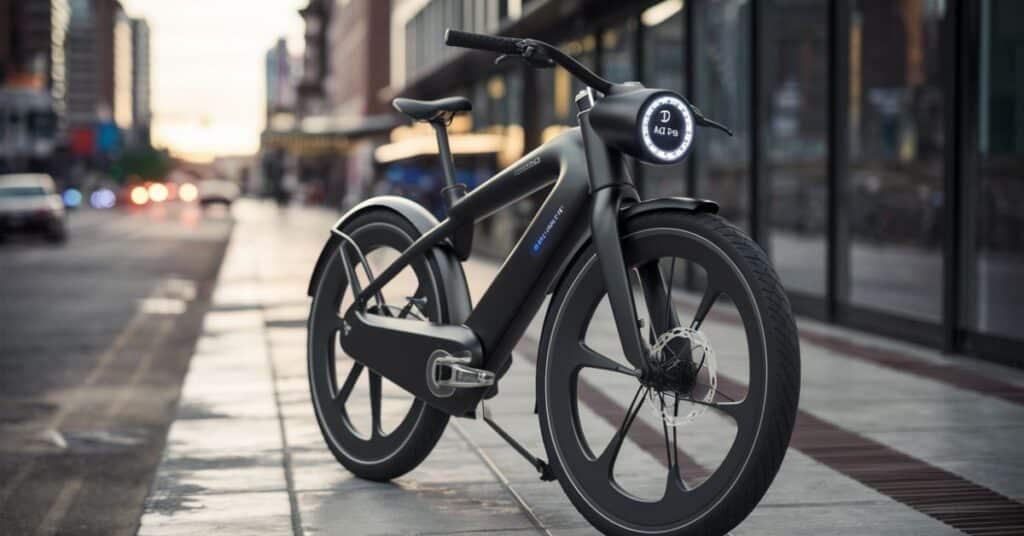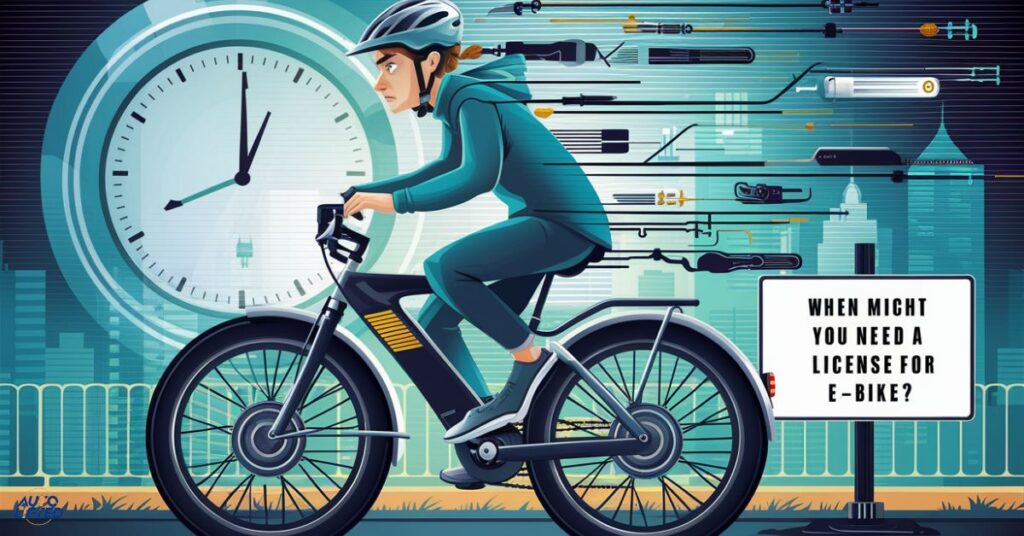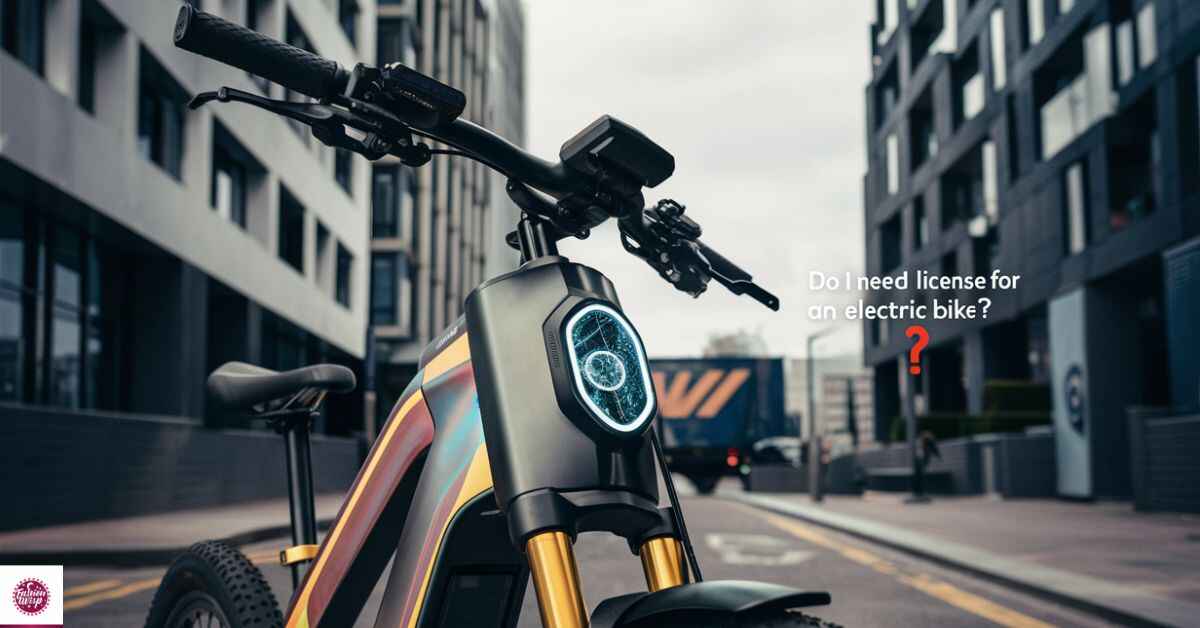Electric bikes are zipping through cities and countryside alike capturing hearts and turning heads. They are eco-friendly fun and efficient. But as these nifty two-wheelers surge in popularity, a cloud of confusion follows. Do you need a license to ride one? Let’s pedal through this topic and clear the air.
What Exactly is an Electric Bike?

Before we dive into the world of licenses and regulations, let’s get our definitions straight. An electric bike or e-bike is like a bicycle’s cooler more powerful cousin. It is got all the familiar bits wheels, handlebars a comfy seat, but with a secret weapon an electric motor.
This motor is the heart of an e-bike. It is there to give you a boost when you are pedaling or even propel the bike on its own. It’s like having a friendly tailwind wherever you go! Some riders describe it as having superhuman strength in their legs.
E-bikes differ from regular bikes in one key way: that handy electric boost. But they’re not motorcycles either. They’re the Goldilocks of two-wheeled transport – not too slow, not too fast just right for many riders.
E-Bike Classifications: It’s All About the Speed
Not all e-bikes are created equal. In fact, there are three main classes:
- Class 1: These bikes are the gentle giants. They give you a boost only when you’re pedaling, and the motor cuts out at 20 mph. Perfect for leisurely rides or commutes.
- Class 2: These have a throttle and can propel you without pedaling. But they still max out at 20 mph. Great for those who want the option to cruise without pedaling.
- Class 3: These are the speed demons of the e-bike world. They’re pedal-assist only but can reach 28 mph. Ideal for longer commutes or riders who want to keep up with traffic.
Remember these classes. They will come in handy when we talk about regulations. Think of them as the e-bike world’s version of driver’s licenses – they determine where you can go and what you can do.
The Big Question: License Requirements for E-Bikes
United States: A State-by-State Breakdown
Here’s the good news: in most cases, you don’t need a license to ride an e-bike in the US. The federal government classifies e-bikes as consumer products, not motor vehicles. It’s like they are saying, “Go ahead, hop on and ride!”
But hold your horses – or should we say, hold your e-bikes. States have their own rules. It’s like each state is hosting its own e-bike party and they all have slightly different dress codes.
Let’s look at a few key states:
- California: No license needed for any class of e-bike. But Class 3 riders must be 16 or older. It’s like California is saying, Come on in, the e-biking’s fine.
- New York: No license required, but e-bikes must be registered. It is a bit like registering your dog – the state just wants to know you’ve got one.
- Texas: No license needed, and all classes are treated like regular bicycles. Texas is basically saying, If it’s got two wheels and pedals, it’s a bike to us!
- Florida: No license required, but riders must be 16 or older. Florida’s taking the old enough to drive, old enough to e-bike approach.
- Illinois: No license needed, but local municipalities can create their own regulations. It is like a choose your own adventure for e-bike rules.
United Kingdom: The Lay of the Land
Across the pond, things are a bit different. In the UK, most e-bikes fall under the EAPC (Electrically Assisted Pedal Cycles) regulations. If your bike meets these rules, you’re in the clear – no license needed.
To qualify as an EAPC, your e-bike must:
- Have pedals (no lazybones bikes allowed!)
- Not exceed 15.5 mph (25 km/h) – faster than a jog, slower than a cheetah
- Have a motor no more powerful than 250 watts – powerful enough to help, not enough to launch you into orbit
If your e-bike ticks all these boxes, you are free to ride without a license. It is like getting a hall pass for the whole of the UK.
When Might You Need a License?

While most e-bikes don’t require a license, there are exceptions. It’s like the difference between a house cat and a tiger – at some point, it stops being a pet and starts being something else entirely.
High-powered e-bikes that exceed the speed or power limits might be classified as mopeds or motorcycles. In these cases, you’d need the appropriate license. It’s the e-bike equivalent of upgrading from a tricycle to a Harley.
In the US, anything over 750 watts or 28 mph might need a license. It’s like crossing the border from E-bike ville to Motorcycle town.
In the UK, if your bike doesn’t meet EAPC regulations, you’ll need to register, tax, and insure it like a motor vehicle. It’s a bit like your e-bike graduating from bicycle school to car college.
Age Restrictions: Can Kids Ride E-Bikes?

Age limits vary by location and e-bike class. It’s like the height requirements for roller coasters – safety first.
Here’s a quick rundown:
| Location | Class 1 & 2 | Class 3 |
| Most US States | No age limit | 16+ |
| California | No age limit | 16+ |
| UK | 14+ | N/A |
| New York | 16+ | 16+ |
| Florida | 16+ | 16+ |
Always check your local laws. They can change faster than a teenager’s favorite band, and it’s better to be safe than sorry.
Safety First: Helmet Laws and Other Regulations

Helmet laws vary widely. In the US, they often depend on the rider’s age and the e-bike class. It’s like a game of rock-paper-scissors, but with ages, classes, and helmets.
Class 3 e-bikes usually require helmets for all ages. It’s like the e-bike world’s version of “If you’re tall enough to ride, you’re old enough to wear a helmet.”
In the UK, helmets are recommended but not legally required for EAPCs. It’s a bit like flossing – strongly advised, but not mandated by law.
Other safety gear isn’t typically mandated, but it’s always a good idea. Consider:
- Reflective clothing (be a star, shine bright!)
- Bike lights (like Rudolph’s nose, but for your bike)
- Bell or horn (toot toot, coming through!)
Remember, safety isn’t just about following laws. It’s about protecting yourself and others. Think of it as a superhero suit – it might not be required, but it sure helps when you’re out saving the day (or just commuting to work).
Where Can You Ride Your E-Bike?
E-bikes can generally go anywhere regular bikes can. This includes:
- Roads (share the road, spread the love)
- Bike lanes (your own private e-bike highway)
- Some bike paths (check local regulations, not all paths welcome e-bikes)
However, Class 3 e-bikes may have more restrictions. They are often not allowed on multi-use paths. It is like being too tall for the kiddie pool, you might need to stick to the big-kid areas.
Off-road trails may have their own rules, so always check before you ride. It’s like checking the dress code before a party – you don’t want to show up overdressed (or over-powered).
Insurance and Registration: Do You Need It?
In most of the US, e-bikes don’t require insurance or registration. It’s like the wild west of cycling – freedom to roam!
New York is an exception, requiring registration for e-bikes. It’s their way of saying, We see you, e-bike rider.
In the UK, EAPCs do not need insurance or registration. It is as easy as hopping on and pedaling away.
However, insurance isn’t a bad idea. It can protect you in case of accidents or theft. Some home insurance policies cover e-bikes, but check with your provider. It’s like an extra layer of bubble wrap for your ride and your wallet.
The Environmental Impact: Why E-Bikes Matter
E-bikes aren’t just convenient – they’re eco-friendly too. They produce zero emissions when ridden and far less when manufactured compared to cars. It’s like having a tiny, personal environmental superhero.
Plus, they can help reduce traffic congestion in busy cities. Imagine if everyone in traffic jams was on an e-bike instead – you’d zip through like a hot knife through butter.
A study by the European Cyclists’ Federation found that e-bikes produce just 22 grams of CO2 per kilometer. That’s compared to 271 grams for cars! It’s like comparing a mouse’s carbon footprint to an elephant’s.
Choosing the Right E-Bike for You
When picking an e-bike, consider:
- Your local laws don’t be the outlaw of the bike lane.
- Where you’ll be riding city streets or mountain trails?
- How much assistance you need a little boost or rocket power?
- Your budget champagne taste on a beer budget, or vice versa?
Remember, a Class 1 e-bike will have the fewest restrictions in most areas. But a Class 3 might be better for longer commutes. It’s like choosing between a comfy sweater and a sleek jacket – it depends on where you’re going and what you’re doing.
The Future of E-Bike Regulations
E-bike laws are still evolving. As they become more popular, we might see more specific regulations. It’s like watching a butterfly emerge from its cocoon – beautiful, but sometimes unpredictable.
Stay informed by:
- Checking your local transportation department’s website boring but necessary
- Joining e-bike forums or groups make some e-bike buddies.
- Following e-bike news outlets be the most informed e-biker on your block
Conclusion
So, do you need a license for an electric bike. In most cases, no But it is crucial to understand your local laws. E-bikes offer a fantastic blend of exercise convenience and eco-friendliness. They are like the Swiss Army knife of transportation – versatile handy, and cool.
Now that you know the rules, get out there and enjoy the ride! Feel the wind in your hair under your helmet, of course and the gentle hum of your motor. You’re not just riding a bike, you are riding the wave of the future.
Frequently Asked Question
Do I need a driver’s license to ride an e-bike?
Generally, no. Most e-bikes don’t require any license. It’s like getting a hall pass for the road!
Can I ride my e-bike on the sidewalk?
This varies by location. Many places prohibit sidewalk riding for all bikes. When in doubt, stick to the road or bike lane.
Do I need to register my e-bike?
In most US states, no. New York is an exception. In the UK, EAPCs don’t need registration. It’s usually easier than registering a car – often, you don’t have to do it at all!
What’s the difference between an e-bike and an electric motorcycle?
E-bikes have pedals and limited speeds. Electric motorcycles are faster and don’t have pedals. It’s like the difference between a jackrabbit and a cheetah – both quick, but on different levels.
Are there any tax incentives for buying an e-bike?
Some places offer incentives. Check with your local government or employer for potential programs. It’s like getting a reward for being eco-friendly.
